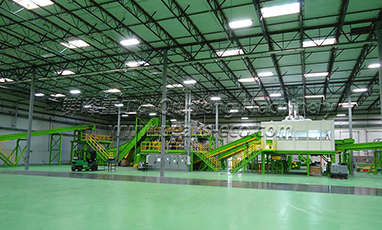Environmental equipment manufacturer to share this article for you.
1. Garbage classification
2. Garbage classification is an urgent task. Effective and high-quality classification of garbage can safely dispose of garbage containing hazardous substances and minimize direct pollution to the soil and the atmosphere.
It can make recyclable materials and kitchen waste that are still of value to be used as resources, saving the precious resources of the earth.
2. Small science of garbage classification
Garbage is the smallest thing in the city, but it is also the biggest thing. Garbage classification management is a sign of social civilization progress and an important manifestation of individual civilized behavior. In order to make the urban environment better, we should develop good habits of garbage classification, advocate green and low-carbon life, make garbage classification a conscious action for everyone, and help our entire city become more beautiful and civilized!
Reduce footprint
Some substances in domestic garbage are not easily degraded, which seriously erodes the land. Garbage classification, remove recyclable and non-degradable substances, reduce the amount of garbage by more than 60%.
Reduce pollution
At present, most of the garbage disposal adopt sanitary landfill or even simple landfill, occupying tens of thousands of acres of land; and the flies fly, the sewage overflows, and the smelly smoke flies, which seriously pollutes the environment. Abandoned batteries contain toxic substances such as metallic mercury and cadmium, which will cause serious harm to humans; waste plastics in the soil will cause crops to reduce production; discarded waste plastics are accidentally eaten by animals, causing accidents that cause animal deaths. Recycling can also reduce harm.

Environmental equipment manufacturer
Turning waste into treasure
30%~40% of domestic waste can be recycled. For example, cans can be used to make pen cases, which is both environmentally friendly and resource-saving; food, plants and fabrics can be composted to produce organic fertilizers; waste incineration can generate electricity, heat or cool; Bricks and tiles, lime soil can be processed into building materials, etc. All kinds of solid waste are mixed together as garbage, and sorting is resources. One ton of waste plastic can reclaim 600 kilograms of diesel oil, and recover 1500 tons of waste paper. It can avoid the felling of forest trees used for the production of 1200 tons of paper. A ton of cans can be melted to form a ton of good aluminum blocks. 20 tons of aluminum ore. If the resource potential contained in the domestic waste can be fully tapped and recovered, Beijing alone can obtain an economic benefit of 1.1 billion yuan per year. It can be seen that recycling is the best way to solve the garbage problem.
3. Types of garbage
Recyclable
It mainly includes five categories: waste paper, plastic, glass, metal and cloth.
Waste paper: mainly including newspapers, periodicals, books, various packaging papers, etc. However, it is important to note that paper towels and toilet paper are not recyclable due to their high water solubility.
Plastic: all kinds of plastic bags, plastic foam, plastic packaging, disposable plastic lunch boxes and tableware, hard plastics, plastic toothbrushes, plastic cups, mineral water bottles, etc.
Glass: mainly includes various glass bottles, broken glass pieces, mirrors, thermos bottles, etc.
Metal objects: mainly including cans, cans, etc.
Cloth: mainly including waste clothes, tablecloths, face towels, school bags, shoes, etc.
These wastes can be recycled through comprehensive treatment to reduce pollution and save resources. For example, 850 kg of paper can be made for every 1 ton of waste paper recovered, saving 300 kg of wood, and 74% less pollution than equivalent production; 0.7 tons of secondary raw materials can be obtained for each ton of plastic beverage bottles recovered; for every 1 ton of waste steel recovered, 0.9 tons of steel is smelted, which is 47% less cost than ore smelting, 75% less air pollution, 97% less water pollution and solid waste.
Non-recyclable
Food waste: food waste including leftovers, bones, vegetable roots, leaves, peels and other food waste.
Other garbage: Including bricks and ceramics, muck, toilet waste paper, paper towels, and other difficult-to-recycle wastes, nutshells, and dust in addition to the above types of garbage. Taking sanitary landfill can effectively reduce the pollution to groundwater, surface water, soil, and air. In fact, the big stick bone is included in "other garbage" because it is "difficult to corrode". Corn kernels, nutshells, fruit cores, chicken bones, etc. are kitchen waste.
Toilet paper: Toilet paper and toilet paper dissolve in water and are not considered "recyclable" "paper", similar to pottery and cigarette cases.
Kitchen garbage bags: The commonly used plastic bags, even if they are degradable, are far more difficult to corrode than kitchen garbage. In addition, the plastic bag itself is recyclable garbage. The correct approach should be to pour the kitchen waste into the trash can, and throw the plastic bags into the "recyclable trash" bin.
Fruit shells: In the garbage classification, the "fruit shell melon skin" logo is peanut shells, indeed it belongs to kitchen waste. The waste cooking oil used at home is also classified as "kitchen waste".
Dust: In the classification of garbage, dust belongs to "other garbage", but the fallen branches and leaves belong to "kitchen garbage", including flowers that bloom at home.
Toxic and hazardous garbage: wastes that contain heavy metals and toxic substances that are harmful to human health or cause actual or potential harm to the environment. Including batteries, fluorescent tubes, light bulbs, mercury thermometers, paint buckets, some home appliances, expired drugs, expired cosmetics, etc. These wastes are generally collected or disposed of separately.